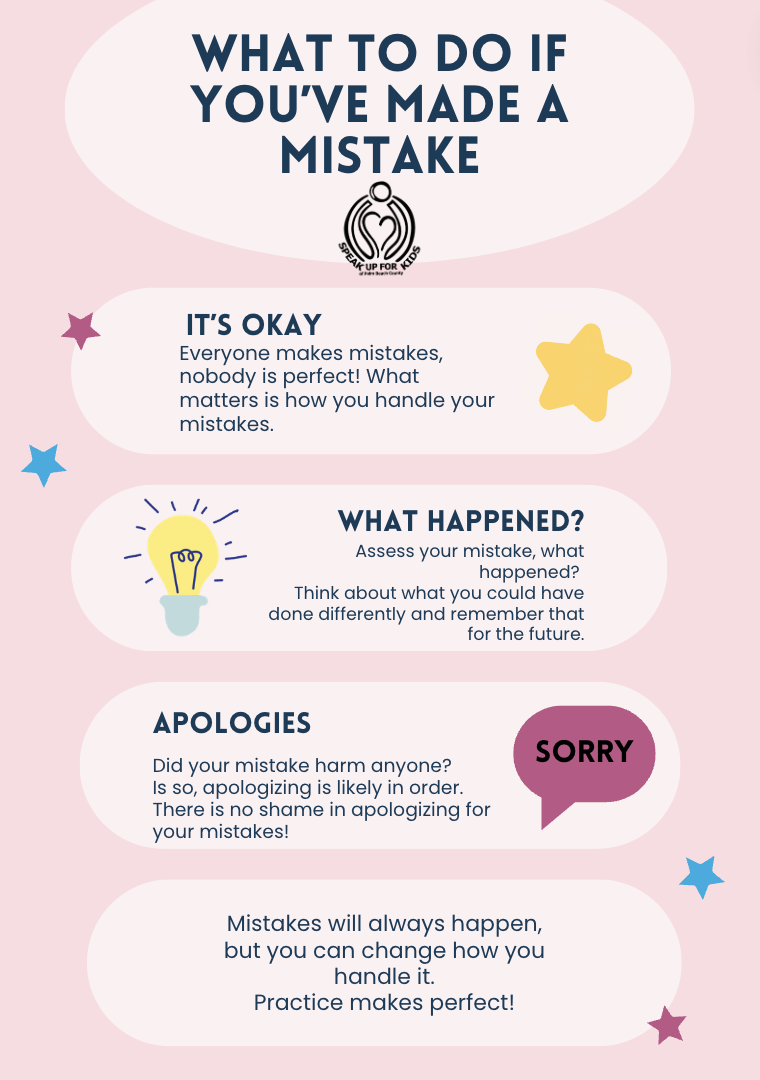What to Do If You’ve Made a Mistake
Contributed by Speak Up for Kids Student Intern Team — This article was developed through the combined efforts of multiple student interns, each bringing unique skills and perspectives to support life skills education for foster youth.
Overview
Making mistakes is an inevitable part of life. How you respond to and learn from these mistakes is crucial for personal growth and success. Understanding what to do when you make a mistake can help you handle the situation gracefully and turn it into a learning experience. Here’s a guide on what happens when you make a mistake and how to respond effectively.
Steps:
Acknowledge the Mistake:
Self-Awareness: Recognize and admit to yourself that you’ve made a mistake. Denial will only prolong the problem and make it worse.
Honesty: Be honest with yourself and others about the mistake. Transparency is key to resolving the issue.
Stay Calm and Reflect:
Pause: Take a moment to breathe and calm down. Avoid reacting impulsively out of frustration or embarrassment.
Reflect: Reflect on what went wrong and why the mistake happened. This helps in understanding the root cause.
Take Responsibility:
Own Up: Accept full responsibility for your actions without blaming others or making excuses.
Apologize: If your mistake affected others, offer a sincere apology. Acknowledge the impact of your actions and express regret.
Assess the Situation:
Analyze the Impact: Understand the consequences of the mistake. How significant is it? Who and what is affected?
Determine Solutions: Think about possible ways to fix the mistake or mitigate its effects.
Learn from the Mistake:
Identify Lessons: Consider what you can learn from the experience. What will you do differently in the future to avoid similar mistakes?
Seek Feedback: Ask for feedback from others involved or from mentors. Their perspective can provide valuable insights.
Take Corrective Action:
Make Amends: If possible, take immediate steps to correct the mistake. This might involve fixing an error, compensating for a loss, or addressing a misunderstanding.
Implement Changes: Apply the lessons learned to prevent future mistakes. Adjust your approach, processes, or behavior accordingly.
Move Forward:
Forgive Yourself: Don’t dwell on the mistake. Forgive yourself and focus on moving forward with the lessons learned.
Maintain Perspective: Remember that everyone makes mistakes. Use the experience as an opportunity for growth and improvement.
Key Questions:
How Do I Acknowledge the Mistake?
Am I being honest with myself and others about the mistake?
How can I admit the mistake without defensiveness or denial?
How Can I Stay Calm and Reflect?
What techniques can I use to stay calm and avoid impulsive reactions?
How can I effectively reflect on what went wrong and why?
How Do I Take Responsibility?
How can I fully own up to my mistake and avoid blaming others?
What is the most sincere way to apologize if others are affected?
What Is the Impact of the Mistake?
What are the immediate and long-term consequences of the mistake?
Who or what has been affected by the mistake?
What Can I Learn from the Mistake?
What lessons can I take away from this experience?
How can I seek feedback to gain additional insights?
How Do I Correct the Mistake?
What immediate actions can I take to fix or mitigate the mistake?
What changes can I implement to prevent similar mistakes in the future?
How Can I Move Forward?
How can I forgive myself and move past the mistake?
What steps can I take to maintain a positive perspective and focus on growth?
Tips:
Be Kind to Yourself: Treat yourself with compassion. Understand that mistakes are a natural part of learning and growing.
Stay Positive: Maintain a positive attitude. Use mistakes as opportunities to learn and improve.
Communicate Clearly: If your mistake affects others, communicate openly and clearly about what happened and what you are doing to rectify it.
Document Lessons Learned: Keep a record of lessons learned from mistakes. This can be a helpful reference for avoiding similar errors in the future.
Final Thoughts
By following these steps and considering these questions, you can handle mistakes effectively and use them as opportunities for growth. Making mistakes is a natural part of life, and how you respond to them can significantly impact your personal and professional development.


